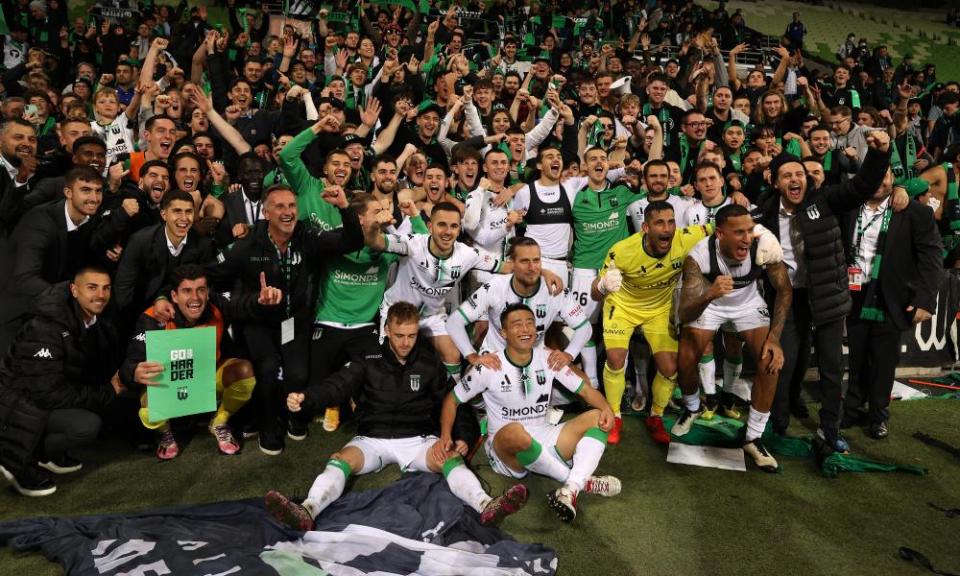Western United move closer to true Melbourne rivalries with on-pitch success

“We deserve to be in the grand final,” John Alosi boomed to the Western United dressing room, his voice raised to take command of a space that had burst into rapturous chants of his name as he entered.
Earlier, the 46-year-old was sprinting onto the field and pumping his fists in celebration before being grabbed in a bear hug by his players. In the foreground, Connor Pain and Dylan Wenzel-Halls were sliding on their knees towards the United fanbase assembled in AAMI Park’s grandstand, celebrating the 98th-minute goal that lifted them to a 4-2 aggregate lead over Melbourne Victory and secured a place in the title decider against Melbourne City.
Related: Western United down Melbourne Victory to reach first ALM grand final
“From all the hard work that we’ve put in from the first day of pre-season and the belief that you have shown from the first day of pre-season,” Aloisi continued. Behind him, injured United captain Alessandro Diamanti, who lost his shirt in the revelry, stood beaming. “That’s why we’re there. We deserve the rewards. No one, no one, other than the people in here, expected us to be there. We did. We knew we were going to get there.”
Whether hard work alone can deliver success is a matter for debate, but Aloisi was much closer to the mark in another regard. Even discounting their underdog status against Victory, there was little expectation at the beginning of the season that Western United would still be standing on the final day.
Yet therein lies the beauty of their run, beyond the momentousness of qualifying for a maiden grand final. Riding a tide of 1-0 wins and boasting a dressing room that is loving life under Aloisi, United have continued to defy those waiting for them to get found out. It was symbolic that backup goalkeeper Ryan Scott, who exemplifies United’s spirit and camaraderie despite not playing a minute this season, was the first to embrace Aloisi following Wenzel-Halls’ goal.
By vanquishing one local rival to set up a meeting with another in the title decider, United’s football department has provided the best possible platform to establish their club as a true player in Melbourne’s ALM scene.
Contempt sent United’s way has largely centred on the continued absence of their promised stadium. Hatred for everything they’re not. Until dirt is broken and construction is under way, that is likely to continue to be the case, but Aloisi’s side have now given their rivals a nascent reason for football rancour thanks to their on-field actions – the lifeblood of true derby rivalries.
Saturday will have stung Victory fans. They’re a bigger club than United. They have more history and trophies. They have more fans and culture. They have a well established, respected place in Australian football. But all that counts for naught in the final reckoning.
Now standing between United and a remarkable title win is Melbourne’s dominant force. Patrick Kisnorbo’s City side will be looking to become the first A-Leagues side to win back-to-back premiership/championship doubles on Saturday evening, in a game which will also be their third consecutive grand final. They’re the best team, with the best players and the best resources. The expectation will be that they win.
Related: Melbourne City beat Adelaide to book ALM grand final against Western United
There can be no greater endorsement of a side’s place in the Melbourne ALM hierarchy than defeating City to win a title – especially with Victory already accounted for. Success has become City’s raison d’être – one more substantial than United’s attempts to fashion its brand as the team of western Melbourne, despite playing several home games at AAMI Park and in Tasmania.
From that stems the flawed idea that Saturday’s game is not a real derby, that United aren’t a real club and that they do not merit the honour of considering themselves a true rival. It is incredulous enough when Victory fans take this view – given the scorched earth approach taken to the existing football scene that preceded their and the A-Leagues’ birth – let alone supporters of a club that was re-badged following its purchase by a global football conglomerate just over a decade ago. Yet it is the prevailing narrative.
Ultimately, the key for United remains in building their stadium and laying down deep roots in the west. But a win by Aloisi’s side on Saturday will not hurt in the short term.

 Yahoo Sport
Yahoo Sport 





































